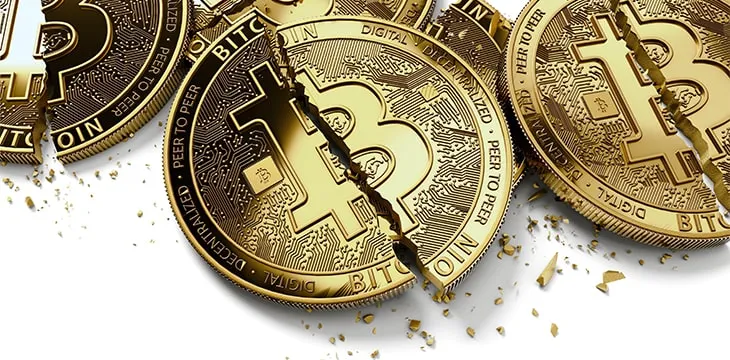|
Getting your Trinity Audio player ready...
|
There are several ticking time bombs BTC investors need to worry about in the coming months and years, including a potential Tether implosion and which government will crack down on Bitcoin mining and trading next.
One of the more immediate concerns is further selling pressure as the mandatory holding period (six months) for Grayscale Bitcoin Trust investors expires in June and July.
Grayscale investors who purchased shares in its BTC Trust in late 2020 and early 2021 will be able to sell their shares in the coming weeks. Analysts from JP Morgan expect that many of those investors will exercise their option to sell, given the change in sentiment regarding BTC in the last several months.
With increasing environmental concerns causing Tesla to abandon BTC as a payment method, widespread crackdowns by China, and a growing chorus of public intellectuals questioning the narrative around BTC’s value proposition, the mood has soured considerably since investors bought into the Grayscale Bitcoin Trust six months ago.
In a letter to investors, the JP Morgan analyst Nikolaos Panigirtzoglou reminded readers that the strongest inflows to GBTC were seen in December 2020 and January 2021. These were $2 billion and $1.7 billion, respectively. He stated his belief that these investors would sell at least some of their shares and that this, in turn, would exert further sell pressure on GBTC and potentially BTC markets in general.
Why is Grayscale important to BTC prices?
Grayscale has become one of the major sources of demand for BTC over the past several years. Its Bitcoin Trust, which trades under the ticker GBTC, has allowed hedge funds and institutional investors to purchase BTC via proxy. At a time when holding BTC coins was impossible for many institutional and regulated investors, the Trust grew in popularity as the next best thing to a Bitcoin ETF.
The Grayscale Bitcoin Trust only owns BTC. Therefore, demand for its shares should reflect the current demand for BTC. It often trades at either a premium or a discount to the underlying asset, giving market participants a good way to measure current sentiment and demand. Since 2015, when the fund launched, it has traded at an almost constant premium, but in the last several months, it has traded at a significant discount.
Why has the premium suddenly flipped negative? There are now many alternative ways for would-be investors to buy the so-called “digital gold.” From Canadian ETFs to purchasing BTC directly with a PayPal account, the attractiveness of holding GBTC shares has diminished significantly.
Adding to these woes is the current climate of uncertainty around the long-term viability of BTC itself, including environmental concerns due to its energy consumption per transaction (BTC is limited to between 3.3 and 7 transactions per second due to its 1MB block size) and how various governments are going to regulate “crypto” going forward.
All of these factors combined could cause a steep selloff of GBTC shares and may negatively affect BTC’s price in the short to medium term.
More trouble ahead for Grayscale and BTC?
It’s clear that the writing is on the wall for the Grayscale Bitcoin Trust. Investors are unlikely to pay a premium for shares in a trust linked to BTC rather than accessing BTC at cost price through the growing list of alternative options. Since there’s no way for investors to redeem their GBTC shares for BTC coins, the Trust’s appeal will likely continue to diminish going forward.
A second line of concern for investors in BTC and for Grayscale itself could be legal in nature. As Dr. Craig Wright was awarded a default judgement on defending his copyright to the Bitcoin white paper in a U.K. court in June, it’s possible that the so-called “Bitcoin Trust” holds no bitcoins at all but rather has been passing off BTC as Bitcoin to investors.
The price of BSV, which Dr. Wright asserts is the original Bitcoin as per his whitepaper, rallied almost 30% upon the judgement.
As other cases such as the COPA lawsuit come to pass, it will become legally established that BSV is Bitcoin, the original peer-to-peer electronic cash system outlined in the whitepaper, leaving unanswered legal questions about the sale of BTC as Bitcoin by Grayscale and others.
Grayscale is owned by the Digital Currency Group, one of the main financial backers of Blockstream. Now that the original Bitcoin protocol has been restored and is on the path to realizing its unbounded potential, it is likely that demand for shares in Grayscale’s other Trusts, which hold mainly altcoins that are incapable of competing with BSV blockchain, will dry up along with demand for shares in its Bitcoin Trust.
Follow CoinGeek’s Crypto Crime Cartel series, which delves into the stream of groups—from BitMEX to Binance, Bitcoin.com, Blockstream, ShapeShift, Coinbase, Ripple and
Ethereum—who have co-opted the digital asset revolution and turned the industry into a minefield for naïve (and even experienced) players in the market.

 07-14-2025
07-14-2025 





